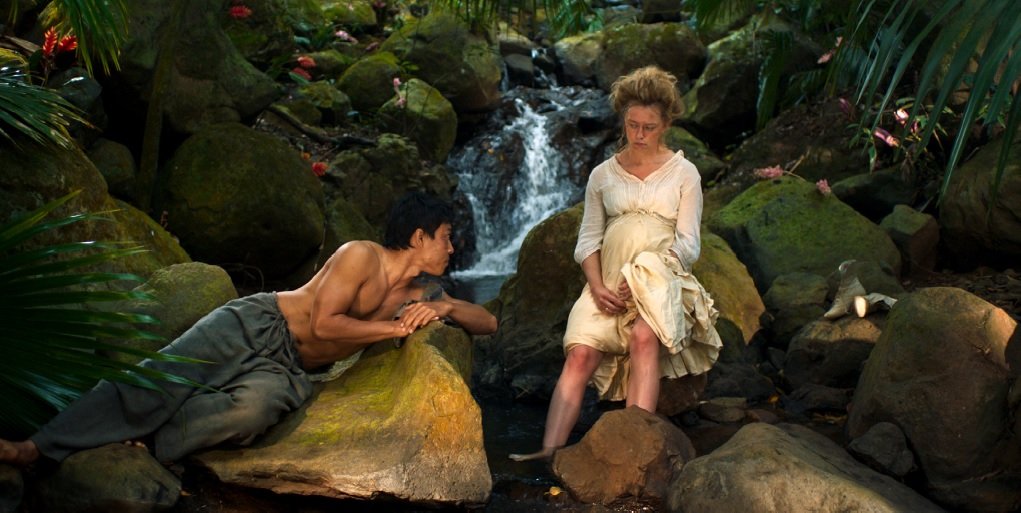How storytellers and filmmakers address pernicious evil is widely varied. For some verisimilitude and realism documenting atrocities is key. For others, such as writer/director Ena Sendijarevic, a funhouse satire becomes the method to uncovering uncomfortable truths. Sweet Dreams is a comic grotesquery about Nederlandsch-Indië (the Dutch East Indies) set in 1900. Choosing absurdity as form Ena Sendijarevic’s bizarre and discombobulating film speaks to the excesses and cruelty of the Dutch colonisation of Indonesia. A centuries long occupation which killed untold numbers and enslaved the Indonesian people.
By 1900 the Dutch interest in the region is waning. Cash crops are still essential to the economy of the Netherlands but continued local uprisings have made colonisers less keen to stay. For Jan (Hans Dagelet) the area remains his personal fiefdom. The sugar plantation owner relishes in cruelty. The film opens with him shooting a tiger while dressed in crisp white and carrying a young biracial boy on his shoulders. Lugging the huge beast one of the workers stumbles because of an injury. The punishment Jan gives is to make him jump repeatedly on the spot – he laughs and the young boy joins in.
Imperious and uninterested in his wife, Agathe (Renée Soutendijk – a Dutch actor who is used to the absurd having worked with Verhoeven in 1981’s The 4th Man) he bullies her about an upcoming ball they will be hosting for other plantation owners. She is to speak Dutch, not Indonesian. The veneer of civility must be maintained. Agathe agrees, as she agrees to most things: to maintain not so much peace in the house, but her ability to stay in it and lavish in her near constant rest which is only punctuated by housekeeper and Jan’s Njai (mistress), Siti (Hayati Azis) bringing her sweet tea.
Siti is the mother of Karel (Rio Kaj Den Haas) the boy Jan was carrying on his shoulders. Her domestic servitude exists in the space of being a servant, a concubine, and woman who is raising Jan’s son. It is simultaneously a position of comparative privilege and degradation. A conundrum which the rebellious worker Reza (Muhammad Khan) reminds her constantly as he tries to lure her away from the villa.
After a dinner party and ball which would not be out of place in a Buñuel film, a drunken Jan grunts his way to Siti’s room where he makes her do her “special dance” (possibly of Sudanese origin) and groans on top of her until he reaches orgasm – an occurrence that happens so often that Karel can count the number of thrusts it takes.
Jan then returns to his bedchamber he shares with Agathe, insults her, and dies of a heart attack. At first Agathe watches impassively, then she moves to ensure he can’t ring for help. Once dead, Agathe gets into bed next to him and the next morning calls for Siti where they both drag the body through the house. Neither has any emotional attachment to the man, but both their positions rely on his death being kept quiet until Agathe’s son Cornelis (Florian Myjer) and his heavily pregnant wife Josefien (Lisa Zweerman) arrive to take on the operations of the sugar mill. The only person who seems to be grieving Jan at all is Karel.
Cornelis and Josefien are representative of a “more enlightened Netherlands,” they want to form some kind of co-operative with the workers (who are striking), get the last cane harvest in, and sell the villa and get the hell out of what Cornelis a backwards place. Two people less suited to be in Indonesia one cannot imagine – but then is any European supposed to be there. Cornelis is a stunted, impotent man, profoundly jealous that Karel even exists. Josefien is a “modern woman,” a sexually frustrated wife, and loses her ability to comprehend what is going on in the villa and the surrounds. Their plans to sell are scuppered by a reading of Jan’s will which states he has left his estate to his only true son, Karel.
Power shifts backwards and forwards. Cornelis, the civilised man, becomes an infant obsessed with besting his child brother. He even suggests killing him and tries and fails in an uncomfortably hilarious scene. As Jan’s body can’t be found (Agathe and Siti likely dumped it in the forest somewhere) there is no definitive proof he is dead. Who really owns the plantation and mill? Agathe will do anything to stay. Cornelis and Josefien will do anything to leave. They can’t go anywhere without the fortune Jan has been providing to subsidise their lives in the Netherlands. Game after twisted game plays out with Siti and Reza sitting on the edge wondering which move they should make. Reza exerts his seductive powers over Josefien and delights in humiliating her.
Plates are thrown, guns are shot, madness takes hold, mosquitoes are no longer swatted, entropy sets in. For Agathe leaving Indonesia would be forsaking what she believes is her right to owning the country – giving up Jan’s legacy which is in her mind building an empire with their own hands (Reza points out that it was far from their hands that built anything). The Netherlands is meaningless to her. If anyone represents the continuum of evil and colonisation it is her.
“You’re all pathetic, puny, parasites,” Agathe yells at her family. Yet it is her family who are the pathetic, puny, parasites who have been feeding off the lands and lives of the people they have left sick and starving. The golden era of Dutch colonialism is fading for the landowners and many have left. The Netherlands is no longer going to pay to keep people there. Agathe is the stalwart who believes what they have done is inherently just.
Ena Sendijarevic’s sugar coated satire is about rot. No one who interacts with the family can remain an innocent. Even young Karel is echoing the sadism of his father. Siti is a woman trying to claim her body and her destiny, but it has already been colonised. Her “romance” with Reza is fraught with his adoration of her and instinctual disgust at her position. If given the chance he would be the “big man,” and replace Jan. It is his homeland, but he is not invited to dine at any table.
The surreal and symbolic ending of the film is richly textured as is all the work. Cinematographer Emo Weemhoff and music composer Martial Foe bring a fable-like quality to the film. It’s a hurdy gurdy waltz that never stops on a near cosmic level. The surreal elements of the film highlight how preposterous and wrong everything is in an imagined paradise and an actual hell.
Sweet Dreams takes the idea that “sugar, spice, and everything nice,” is just a recipe for decay. Ena Sendijarevic’s satire is efficient, cruel, and unbearably true. It might appear to be a cat and mouse story about one family and their dysfunctional machinations, but Sweet Dreams is about the act of colonialism and the malevolence that accompanies taking a land, a culture, and a people and subjugating them for profit. A carnivalesque piece of cinema that spares no one.
Writer: Ena Sendijarevic



